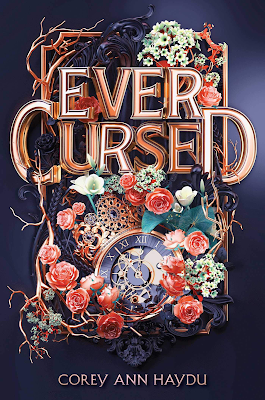Review: Ever Cursed
Ever Cursed by Corey Ann Haydu reinforces the reasons that I enjoy indie fairy tale books more than books released by mainstream publishers over the past decade or so. This book was released by Simon and Schuster, a very well-known publisher of both juvenile and adult books that I used to read often when I was a child. Yet, it is so woke and borderline inappropriate--even for teenagers--that I'm shocked they would allow such a story to sit on bookshelves in the Young Adult section of stores. Maybe shocked isn't the right word. I'm disenchanted with the modern mainstream portrayal of fairy tales in general. Like most contemporary media, this book contains a clear political message that is stronger than the plot or characters who reside within it.
One of the most common criticisms of classic fairy tale princess stories is that they are misogynist. Princesses are always targets, witches and queens are always evil, and brave heroes always save the day. Over time, these stereotypes have been overturned with princesses who fight to defend their kingdoms, villains who are just misunderstood, and love interests who are evil or absent entirely. Writing a book that criticizes the old stereotypes to such a hyperbolic level is neither original nor eye-opening, but instead, misandric, a term that is rarely used because many feminists believe that there is nothing wrong with hating men. Yet, Ever Cursed is one of the most woke, pessimistic, and misandric books I have ever read, and it does all of this under the guise of classic fairy tale elements.
Ever Cursed alternates between the perspectives of Jane, a princess who is cursed to never eat, and Reagan, the witch who cursed her. If this book had been written twenty years ago, Regan would have been the villain. In the modern era of princesses forgiving those who have wronged them, she is a misunderstood hero because the king's actions are interpreted to be far worse than any curse. There are other princesses who were cursed by Reagan as well, but the book hardly focuses on any of them. Jane and her sisters are known throughout the kingdom as the Princesses of Without. One of her sisters is cursed to forget everything, another not to love, another not to sleep, and another still not to hope. That last one is particularly important because hope is something that this book severely lacks, which makes it feel empty as a princess story. Reagan tasks the princesses to find four objects that can be enchanted to break their curse, similar to Into the Woods.
This book is essentially a retelling of Disney's 2014 Maleficent film, but it does so in a more spiteful and pessimistic way. Maleficent made one mistake by cursing the daughter of the man who wronged her and comes to regret it shortly after getting to know Aurora. Reagan's mother was wronged by the king, so Reagan traps his wife in a box and curses all five of his daughters. Yet, she is the one we are supposed to root for because the king does not suffer when he sees his daughters suffering. Reagan's love interest, Abbot, is the only decent male character in the book, but even he does little to stop Reagan's tyranny other than scolding her for cursing the princesses. All of the other men in this world are portrayed as soulless uncaring creatures who find it charming that Princess Jane is slowly starving to death. This book suffers because it is impossible to tell a princess story through hate when the one thing princesses have in common is the strength of their love.
I can appreciate that the author of this book tried to do something different. In fact, the concept of witches growing permanent skirts around their bodies in different fabrics and colors for every spell cast was very creative. However, the book's message felt like an obligatory political statement that all modern mainstream media must follow. None of the characters were particularly interesting, and the villain bore too much resemblance to a certain recent politician to even be taken seriously. I would not recommend this book to anyone under the age of 18 due to its coarse language and references to sexual assault and eating disorders. Yet, its simplistic narrative structure and plot wouldn't hold the interest of many readers over the age of 18, so I suppose I wouldn't recommend it to anyone except as an educational study to see how far woke culture has gone.












Comments